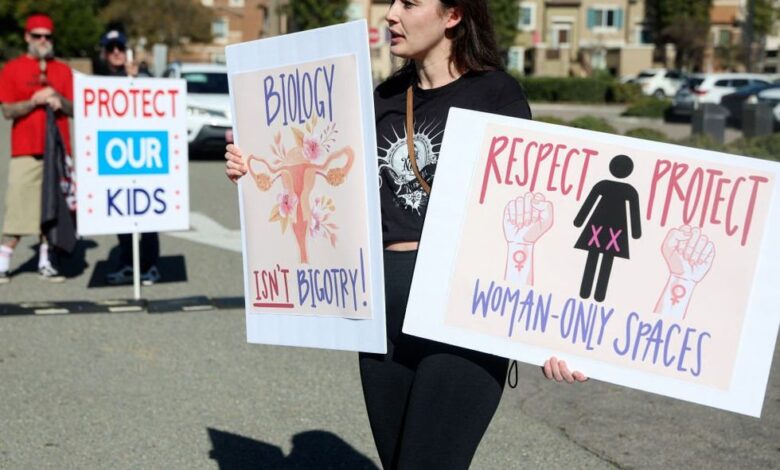Trump’s culture war offensive won the election

Donald Trump has made an impressive political career of proving the D.C. consultant class wrong. In 2016, he won the presidency by running a campaign nearly the opposite of what the infamous RNC “autopsy” report had prescribed four years earlier. In 2020, he came just 42,000 votes short of winning again, despite facing unprecedented obstacles from a global pandemic and its aftermath.
And now, Trump has once again shown his instincts are far better than those who claim to be “professionals.” In an election where most pundits were urging Republicans to hyper-focus on standard issues such as the economy and immigration, Trump instead went on offense on one of Democrats’ greatest vulnerabilities: their far-left stance on transgender issues. That decision has propelled him back to the White House.
If you don’t trust the polling, then you should at least trust the results.
In the final few weeks, exposing Kamala Harris’ transgender radicalism became the closing message of the Trump campaign. According to AdImpact, Republicans spent at least $215 million total on ads highlighting the radical consequences of the Harris-Walz agenda: male athletes in women’s sports, sex-change surgeries and puberty blockers for minor children, ideological indoctrination in public schools, and, most visibly, taxpayer-funded sex-change operations for prisoners and illegal immigrants. One reportsuggests Trump focused his ads more on these issues than on the economy, housing, and immigration combined.
This strategy flew directly in the face of conventional wisdom. In the run-up to the election, politicos from both parties argued that the transgender issue only catered to the GOP base and wouldn’t resonate with the wider electorate. Yet outside their D.C. bubble, the issue was indeed resonating. For anyone with a pulse on the average American voter, this shouldn’t have come as a surprise.
For years, polling has shown that Democrats’ transgender stances are extremely unpopular. For example, a 2023 NPR/PBS NewsHour/Marist poll found voters opposed to allowing minors to receive “gender transition-related health care” by 37 points, even if a parent or guardian consents. A Yahoo News survey this month showed Americans believe that the left’s gender-ideology agenda has gone too far by a 24-point margin. And a YouGov poll found voters in swing states agree with the Republican position on gender and bathrooms by margins of 16 points or more.
Such lopsided numbers aren’t just driven by Republican respondents, either. Large numbers of independents, young people, suburban women, black voters, and Latinos all side with conservatives on these issues.
But if you don’t trust the polling, then you should at least trust the results. The first general election cycle focused this heavily and forthrightly on transgender issues was in 2021. There, the transgender debate helped propel Gov. Glenn Youngkin in the final weeks to his shocking upset in Virginia. Meanwhile around the country, dozens of states were beginning to pass laws to prohibit males in girls’ sports and restrict gender transition procedures for minors. When South Dakota Gov. Kristi Noem (R) decided to veto a transgender sports bill early in the year, a massive backlash followed. To Noem’s credit, she changed course and signed a similar bill in the following legislative session.
In 2022, opposition to the transgender agenda continued to gain momentum. Yet more states took action, including in Texas, where Gov. Greg Abbott declared gender transitioning children to be child abuse. In Florida, Gov. Ron DeSantis won a resounding re-election after a first term defined in large part by his embrace of cultural conservatism. This set him apart from many other GOP candidates nationwide, most of whom barely used gender issues in ads — to their detriment. In a midterm where Republicans largely underperformed, failing to take advantage of one of the Democrats’ biggest vulnerabilities turned out to be a significant mistake.
Of course, that was not the case this year. Beyond Trump’s own campaign, numerous other candidates went on offense on gender issues, spending hundreds of millions of dollars in Senate and House races nationwide. This was a smart strategy, not only to energize the Republican base but also to appeal to persuadable voters. According to data collected by my organization’s political arm, American Principles Project PAC, our own ads on transgender issues we have run in campaigns since 2019 have consistently moved tens of thousands of swing voters from Democratic to GOP candidates.
In this year’s election, one can also trace the potential effect these ads had through polling. For example, in Ohio’s U.S. Senate race, the Senate Leadership Fund began running ads highlighting Democrat Sherrod Brown’s record on transgender issues in early September. Around the same time, Republican Bernie Moreno began to rise in the polls, eventually pulling even with Brown after trailing by six points when the ads first started, according to the FiveThirtyEight average. Similar movement can be seen in many other races where such ads were aired.
In short, there can be little doubt that Republicans’ culture war offensive was a decisive element of their victory. And with Democrats now on the back foot, the GOP should press its advantage. Force Democrats to take votes in Congress on keeping men out of women’s sports and protecting kids from dangerous transgender medical procedures. Take executive action on these issues and dare Democratic leaders in blue states to sue. As long as the left continues to stick to these unpopular positions, they will continue to be a liability for them.
Twice now, Donald Trump has bucked D.C. elites and been rewarded for doing so. Perhaps it’s time for those elites to finally start taking notes.




